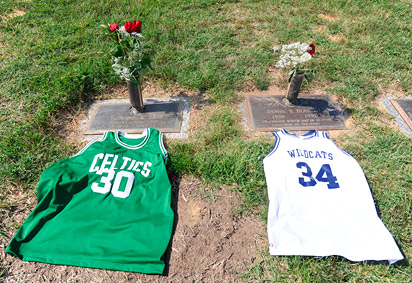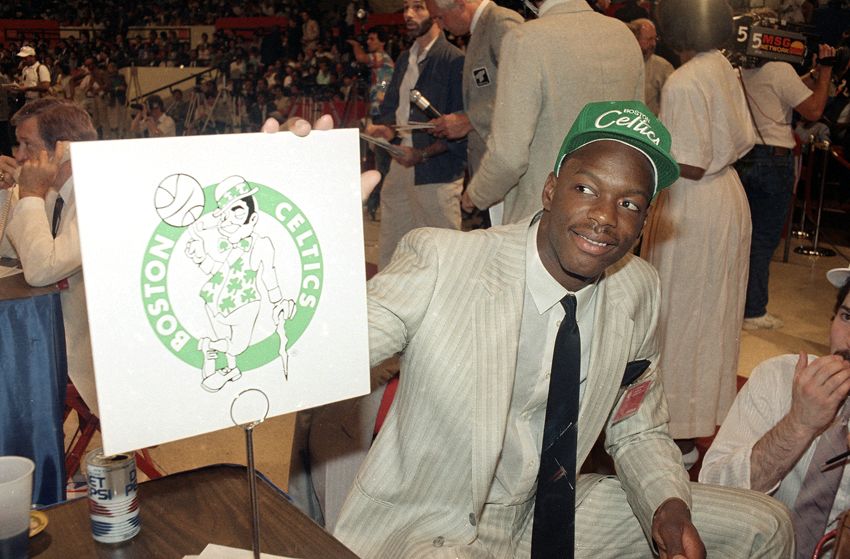by Michael Weinreb
Originally published on ESPN
It’s true, what she says about the graves. I went to see them not long after I heard Lonise Bias tell an incredible story to a group of South Carolina high school students: While witnessing the burial of her son Jay, she looked down and realized she was standing on the grave of her eldest son, Leonard. I had assumed it was a rhetorical flourish, a metaphor crafted for effect by a guest speaker who was getting paid to whack some sobriety into a room of spaced-out pubescents with self-image issues.

But then I drove to the cemetery, in a Maryland suburb of Washington called Suitland, and I trudged up a hill, and I found the markers, a couple of rectangles blotched with age, stamped into the dirt and rocks and tufts of grass. And it is true — there is perhaps a foot of space between her boys. They are, quite literally, resting side by side.
Len and Jay Bias, brothers who died less than five years apart, are literally now resting side by side. The graves, tucked together like this, are a stark testimony to the complexity of Lonise Bias’ grief. It is impossible to comprehend the hellish depths she has plumbed, and it is equally difficult to see how she emerged with such palpable vigor, determination and self-assurance. This is what makes her come across as a bit strange, especially to a roomful of teenagers; instead of crushing her spirit, unspeakable family tragedy has stripped her of the angst and self-doubt that paralyzes much of her audience. She opens her speeches by telling people she does not particularly care what they think of her, which permits her to bellow phrases like, “I AM THE LEGACY THAT WAS LEFT BEHIND!” and “I CAME THROUGH TO SHOW YOU THE WAY!” and somehow make them sound authoritative rather than bombastic.
Len and Jay Bias, brothers who died less than five years apart, are literally now resting side by side. The graves, tucked together like this, are a stark testimony to the complexity of Lonise Bias’ grief. It is impossible to comprehend the hellish depths she has plumbed, and it is equally difficult to see how she emerged with such palpable vigor, determination and self-assurance. This is what makes her come across as a bit strange, especially to a roomful of teenagers; instead of crushing her spirit, unspeakable family tragedy has stripped her of the angst and self-doubt that paralyzes much of her audience. She opens her speeches by telling people she does not particularly care what they think of her, which permits her to bellow phrases like, “I AM THE LEGACY THAT WAS LEFT BEHIND!” and “I CAME THROUGH TO SHOW YOU THE WAY!” and somehow make them sound authoritative rather than bombastic.
“I’ve been termed as being ABNORMALLY ENTHUSIASTIC,” she is saying. “But I am full of passion BECAUSE I BELIEVE IN YOU. I am standing here to TELL YOU that you CAN MAKE IT.”
It is a Monday morning, and Lonise Bias is sweating underneath the spotlights on the stage of a high school auditorium in a quiet corner of South Carolina. The assembly is mandatory. And it doesn’t matter that no one in this room knows who she is anymore, or who her sons were, or where they came from, or why her story means anything at all. It doesn’t matter that she was hired blind by a teacher who read her biography on the Web site of a speakers’ bureau and thought, “Well, that sounds kind of appropriate for a schoolwide assembly,” and it doesn’t matter that she momentarily forgets where she is, and refers to the students of Greenwood High School as the students of Greenville. It doesn’t matter, because it is hard not to listen when a woman with this kind of overbearing presence IS TALKING RIGHT AT YOU.
She has always possessed a robust set of vocal cords. When she was in elementary school, and the faculty needed a child to speak loudly enough for a large group to hear, they chose her. She grew up tall and imposing, with a natural-born gravity; after her speech at Greenwood, more than one student said Lonise Bias reminded them of their mothers. Perhaps, she always thought, she would teach someday, but she imagined it would be in Sunday school, not in a place like this, a public school several hundred miles from the suburban Maryland county where her life has played out like a soap opera.
E-ticket writer Michael Weinreb discusses the lasting impact of Len Bias’ death on “Outside the Lines: First Report.”
She was working as a customer service manager at a bank back in June 1986 when her eldest son’s death became a national headline. If you were alive then, and you cared at all about sports, or about drugs, you most likely remember it well. It was one of those moments — like JFK, like Martin Luther King Jr., like the space shuttle Challenger earlier that same year — when we, as a society, stopped and stared collectively into the void and declared that human existence was entirely unjust.
Here, though, is what’s weirdest of all about Lonise Bias: She, of all people, does not believe the events of that day were unjust. In fact, she believes the events of that day were unavoidable. She has never allowed herself to project into the future, or to examine the possibilities, the endless permutations of what-ifs that guide the discussion of her son whenever his name arises. For her, there was only this future. For her, there was only this possibility. In the days after her son died, her public demeanor was so stoic and unflinching that she received letters from people declaring her a phony. And she admits that among the other emotions her son’s death brought on, it brought relief.
Not long after Len Bias’ death, she made a life-changing appearance on a Christian television program, “The 700 Club,” in which she explained why. She described the premonitions she’d been having, and the dreams, and the inexplicable emotional breakdowns, and the visions she assumed were coming directly from above, all imbuing her with a heavy and inextricable feeling that her son was not meant to play professional basketball. Her son, who in his senior season at the University of Maryland was widely regarded as the best college basketball player in America, a can’t-miss talent with absurd hang time. Her son, who had been drafted with the No. 2 pick by the NBA champion Boston Celtics on June 17, 1986. Her son, who would be described in an autopsy report two days later as a “well-developed young Black male,” 6-foot-7, 221½ pounds, otherwise fit and healthy and clean, with the exception of the copious amount of cocaine in his system.
“I can remember speaking to this woman once before Len died, and she had said, ‘Things are going to be so wonderful for you all,'” Lonise Bias says. “And I remember telling her this very clearly. I said, ‘It looks like I can go over to that table and pick up whatever’s on that table. It looks like I can do it, but there can be something that can stop me from doing it.’ So I guess what I’m saying is, while everyone else was cheering, I was still waiting to see if it was going to happen, because …”
For a moment, she is somewhere else, her gaze fixed on a table a few feet from where she sits in an office adorned with photographs of her posing next to presidents and congressmen as a well-compensated motivational speaker of some renown, as a proud foot soldier in the war on drugs. Twenty-two years have passed, and Len Bias has been dead as long as he was alive. And clouds of doubt and shame and confusion linger, and truthfully, no one wants to talk very much about the long-term meaning of Len Bias except Lonise Bias, who cannot stop talking about it. All because, several years before her sons would come to lie side by side in those two narrow burial plots and several months before her life became altered by grief, the mother had a vision of her eldest son as a martyr.
CAUSE OF DEATH
Autopsy No. 86-999
Prince George’s County
Leonard K. Bias
June 19, 1986
DIAGNOSIS:
1. Cocaine Intoxication
OPINION:
LEONARD K. BIAS, a 22-year-old Black male, died as a result of cocaine intoxication, which interrupted the normal electrical control of his heartbeat, resulting in the sudden onset of seizures and cardiac arrest. The blood cocaine level was 6.5 milligrams per liter. Toxicological studies for alcohol and other drugs were negative. Due to the ongoing investigation of the circumstances surrounding his death, the manner of the death is ruled UNDETERMINED at this time.

Len Bias on draft night
AP Photo/Isaac Brekken
Len Bias said his dreams came true when he was selected by Boston with the second pick of the ’86 draft. Less than two days later, he would be dead.

Man I watched some of his youtube highlights, he was pretty amazing!
Here is 5 minute documentary on him: http://youtube.com/watch?v=SvyHXqJIxTw
Salams,
Asalamu alaykum,
I was 13 at basketball camp when I heard the news from one of my coaches. I never knew about his younger brother until I read this article. One thing that really sticks out is how our decisions, although seemingly during the heat of the moment appear so personal, touches so many others.
The other lesson is the famous 911 call. It should be on Youtube and I encourage folks to listen to it. “This is Len Bias…This is Len Bias! He CAN’T DIE!.”
SDW
http://youtube.com/watch?v=y4u4MdSGSDo&feature=related
He was a beast man, what a dark ending on such a bright future. The Angel of Death has no obstacles when it’s time for us to go, subhan Allah.
As Salaamu Alaikum Sheikh Suhaib,
This is a bit unrelated, but it looks like Oklahoma City is getting an NBA franchise: http://nbcsports.msnbc.com/id/25502466/
Congrats. Any thoughts on names? Oklahoma Okies? Oklahoma Azharis?
[…] Sounds like the man isn't cut out for the New York spotlight (but who in their right mind is? …The Day Innocence Died [Reflections on the Death of Lenny …The Day Innocence Died [Reflections on the Death of Lenny Bias]: Michael Wenireb ESPN … E-ticket […]